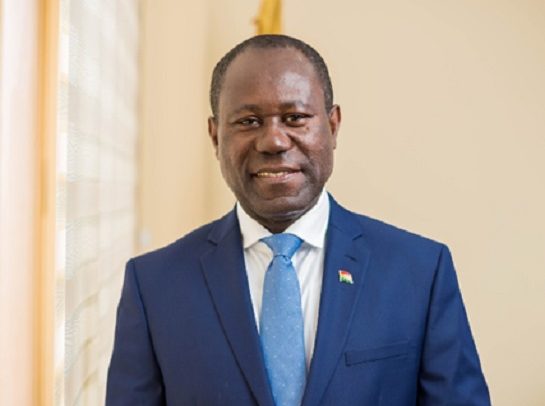Joseph Boahen Aidoo
CHIEF EXECUTIVE Officer of Ghana Cocoa Board (COCOBOD), Joseph Boahen Aidoo, has disclosed that efforts put in place by government to increase cocoa production in the country is yielding results, especially in Sankore and other parts of Bono Region.
Mr. Aidoo disclosed this yesterday in Sunyani during an interaction with the media after touring cocoa districts in Ashanti, Ahafo and Bono regions.
“For one week we have been touring Ashanti, Ahafo and Bono Regions to interact with farmers, workers and other stakeholders in the industry to see things for ourselves per reports we get from officers from the field. We tell them issues affecting the well-being of their farms and try to use animations to explain technical things we expect them to do on the farms,” he disclosed.
Mr. Aidoo stated that the board is making sure farmers recover some cocoa farmlands which have been affected by swollen shoot disease, particularly in Asunafo South District of Ahafo Region, stressing they are to cut down diseased cocoa trees for replanting as well as sustaining innovations such as mass spraying, hand pollination, and pruning. He also emphasised the use of organic manure instead of inorganic to increase cocoa yield per acre.
According to the COCOBOD boss, recovery mission started in 2017 after a study conducted found out that 17 percent of cocoa farms in the country have been affected by swollen shoot disease, stressing, “We don’t want this to continue so we brought in containment measures. It is a virus disease and no remedy for it. The only remedy is to eradicate by cutting down the trees, destroy stumps and roots otherwise the disease remain. By that we break the chain so we expect farmers to submit their farms for rehabilitation.”
Dwelling on the sustainability mission, he noted COCOBOD has promoted a number of intervention such as hand and cross pollination and pruning. “It is gaining grounds and farmers in Bono and Ahafo are doing well. However, we are disappointed nowhere in the region that farmers are able to harvest up to 20 bags per acre, and so we encourage them to apply the innovations so that they can harvest between 30- 35 bags per acre next time we come around,” he stressed.
According to him, the entourage explained to farmers the need to stop applying weedicide on their farms and instead use organic fertiliser (animal dropping), which replenish lost nutrients.
“It is not good for their health and the environment. We explain to them to organically treat their farms by not burning weeds or logs on farms but allow them to rot and decay to become nutrients for the cocoa plants. Any plant cut down become food for the soil. They are not to use 24D on the farms,” he added.
Mr. Aidoo also highlighted on Cocoa Pension, saying though it is voluntary, all farmers should hook on to it since without it cocoa farmers cannot benefit from government support in that regard.
“There is also cocoa management system where data on all cocoa farmers and their farmlands is documented and can be traced on whatever goes on the farms.
“Any cocoa farmer who does not follow these new regulations, for example, by cultivating their cocoa farms in forest reserves shall not have their cocoa purchased and cannot enter in the European markets.
“There are technologies at Tema to determine all these. So these are issues we have been engaging the farmers on our tour. From first January 2025, if we cannot show traceability of your farms, your cocoa cannot enter EU market,” he emphasised.
The COCOBOD CEO also explained to farmers the mechanism involved in determining producer price, saying the country does not have control over pricing since it is determined by buyers at the world market.
Mr. Aidoo was accompanied by his deputy CEO (A& QC), Dr. Ebenezer Owusu, Dr. Francis Padi, Executive Director Cocoa Research Institute, Mr. Lawrence Adu Twum, Executive Director Seed Production Division and Mr. Samuel Saka Boateng Managing Director, Quality Control Company Limited.
The rest are Rev. Edwin Afari, Executive Director, Cocoa Health and Extension Division and Samuel Addo Agyakwa, CODAPEC Coordinator. They visited farms and interacted with chiefs in Sunyani, Techiman and Bechem, Goaso and ended at Mim in Ahafo Region.
FROM Daniel Y Dayee, Sunyani

